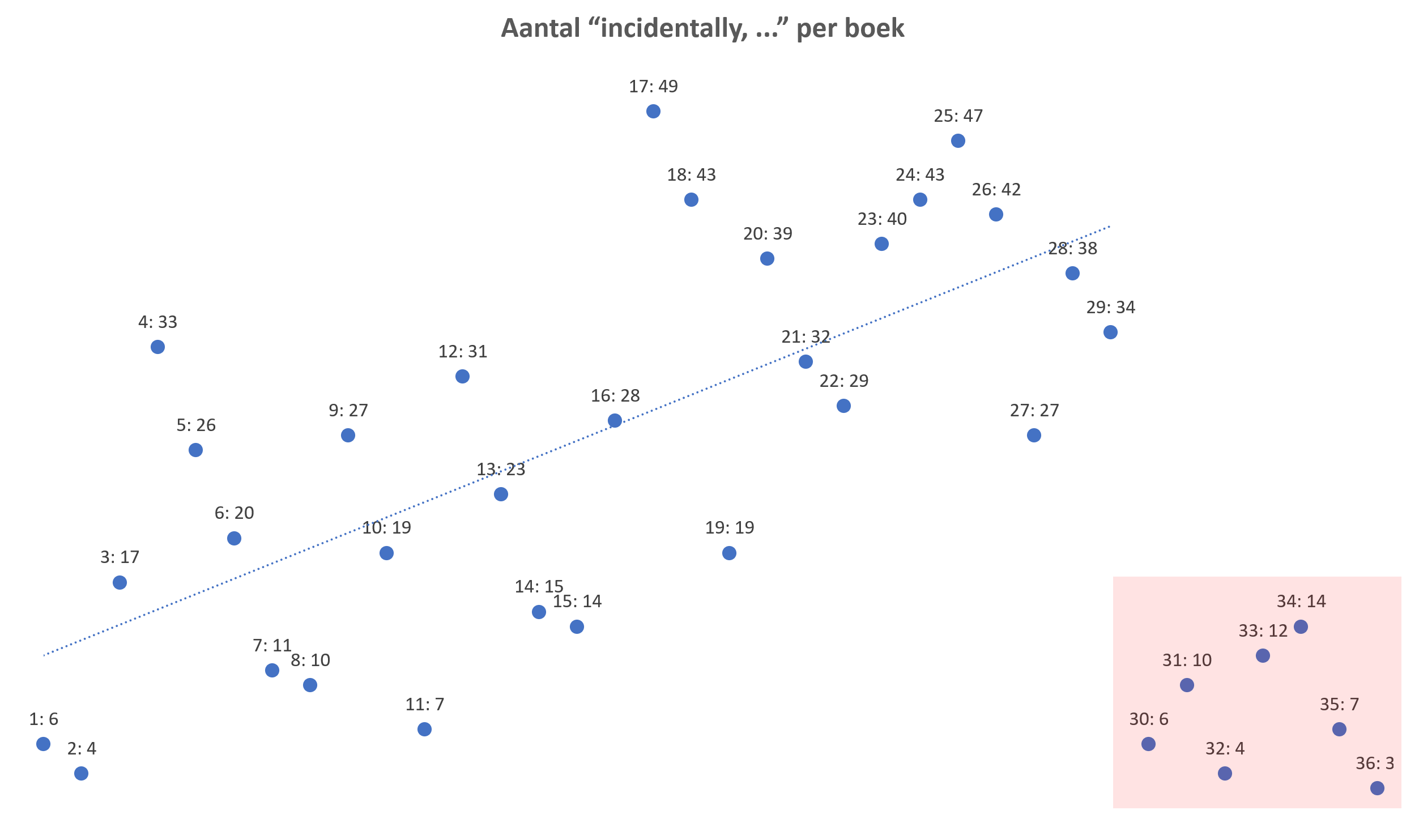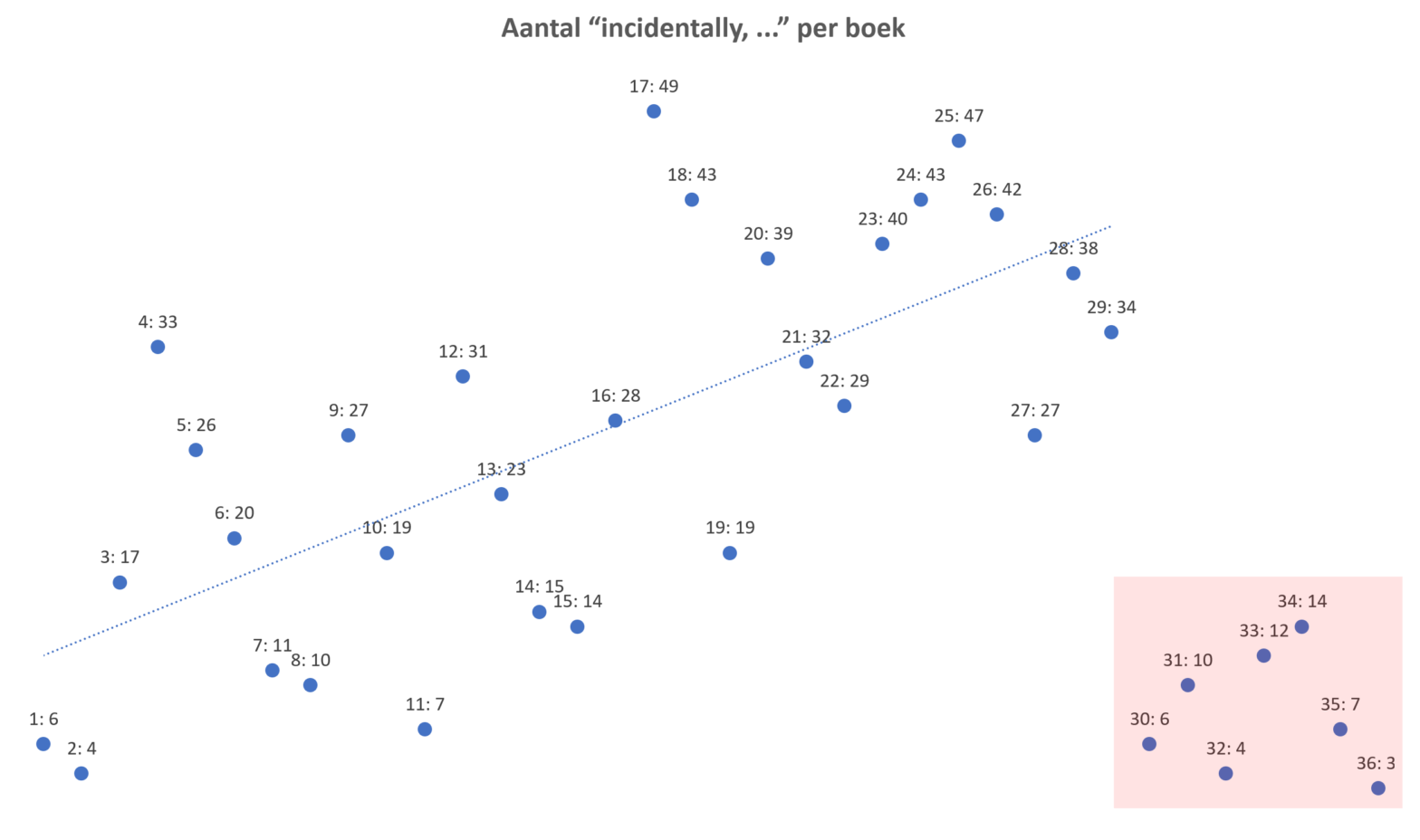Het was mij niet opgevallen in het eerste boek, omdat het al met al nog redelijk beperkt bleef en niet altijd als inleiding voor een discursus gebruikt werd:
- Interestingly enough, the word for meat is Sa-Tassna, which means Life-Mother. Incidentally, when one speaks of food in general, one always speaks of Sa-Tassna.
- I would have given my name as Tarl Cabot of Ko-ro-ba, or, more simply, as Tarl of Ko-ro-ba. The Lower Castes, incidentally, commonly believe that the names of the High Castes are actually use-names and that the High Castes conceal the real names.
- It is interesting, incidentally, that in the Gorean language, the word for stranger is the same as the word for enemy.
Maar in de volgende boeken is het vaak het begin van een ellenlange uitleg over dingen die eigenlijk weinig of niets met het verhaal zelf te maken hebben.
- The purpose, incidentally, of the brief garment of the female slave is not simply to mark out the girl in bondage but, in exposing her charms, to make her, rather than her free sister, the favoured object of raids on the part of roving tarnsmen. (volgt een les sociologie en klederdracht)
- Chronology, incidentally, is the despair of scholars on Gor, for each city keeps track of time by virtue of its own Administrator Lists. (volgen drie bladzijden over tijdsrekening en kalenders)
- I was told, incidentally, that the language of the Priest-Kings does possess more morphemes than English but I do not know if the report is truthful or not, for Priest-Kings tend to be somewhat touchy on the matter of any comparisons, particularly those to their disadvantage or putative disadvantage, with organisms of what they regard as the lower orders. (volgt een cursus fonologie)
- Their basic mathematics, incidentally, begins with ordinal and not cardinal numbers, and the mathematics of cardinal numbers is regarded as a limiting case imposed on more intuitively accepted ordinalities. (meer over wiskunde bij aliens)
- Incidentally, Gorean coins are not made to be stacked and accordingly, because of the possible depth of the relief and the consequent liberties accorded to the artist, the Gorean coin is almost always more beautiful than the machine-milled, flat, uniform coins of Earth. (volgt een cursus vergelijkende numismatiek)
- The nose ring, most often, is worn by a slave. These rings, incidentally, those for the ears and for the nose, do not serve simply to bedeck the female. They also have a role to play in her arousal. (volgt een les erogene zones)
Ik vind het enorm grappig hoe Norman zich niet kan inhouden om mensen een uitleg te geven. Zoals deze klassieker:
“It will be a convenience for me to have a name for you,” I said.
“Yes, Master,” she said.
“You are, ’Feiqa’ ” I said, naming her.
“Thank you, Master,” she breathed, elated, ’Feiqa’ is a lovely name. It is not unknown among dancers in the Tahari.
Other such names are ’Aytul’ ’Benek’, ’Emine’, ’Faize’, ’Mine’, ’Yasemine’ and ’ Yasine’. The ’qa’ in the name ’Feiqa’, incidentally, is pronounced rather like ’kah’ in English. I have not spelled it ’Feikah’ in English because the letter in question, in the Gorean spelling, is a ’kwah’ and not a ’kef’. The ’kwah’ in Gorean, which I think is possibly related, directly or indirectly, to the English ’q’, does not always have a ’kwah’ sound. Sometimes it does, sometimes it does not; in the name ’Feiqa’ it does not. Although this may seem strange to native English speakers, it is certainly not linguistically unprecedented. For example, in Spanish, certainly one of the major languages spoken on Earth, the letter ’q’ seldom, if ever, has the ’kwah’ sound. Even in English, of course, the letter ’q’ itself is not pronounced with a ’kwah’ sound, but rather with a ’k’ or ’c’ sound as in ’kue’ or ’cue’.
I gathered my shield and weapons from the grass near us, where they lay with my pack. I slung my helmet over my left shoulder. I set my eyes to the southeast, away from the high gray walls of Samnium.
“Fetch my pack, Feiqa,” I said.
Fantastisch.
Mijn hypothese was dat hij het na een paar boeken beu zou zijn om stapels en stapels worldbuilding te doen, en dat het gebruik van “incidentally” dus wel zou afnemen. Een hypothese is er om te testen, en dus ben ik de boeken allemaal afgegaan. 🙂
Neen dus. We blijven dingen bijleren, en dingen bijleren. Deze is van boek 29:
Gorean, incidentally, is written “as the bosk plows,” which requires an alternating laterality, the first line read from left to right, the second from right to left, and so on.
Ongelooflijk, dat we 28 boeken lang niet wisten dat Goreaans boustrofedon geschreven werd!
Maar kijk, als ik een grafiekje maak, is het wél alsof hij het op een bepaald moment opgegeven heeft. Het gaat gemiddeld alsmaar naar boven met de “incidentally, ” — maar dan in 2011, bij het dertigste Gor-boek, verandert het plots helemaal voor de laatste zeven boeken.

Misschien zag John Norman het niet meer helemaal zitten. Misschien was de wereld genoeg omschreven. Of misschien (de samenzweringsdenker in mij) is dat wel een aanduiding dat het dan plots slechter is beginnen gaan met hem. In 2011 werd hij 80 — zou het hetzelfde kunnen zijn als bij Agatha Christie, dat min of meer kan aangetoond worden wanneer dementie begint toe te slaan?
De woordenschat wordt in ieder geval niet minder rijk met de leeftijd, als ik tel hoeveel unieke woorden er in elk boek staan:



Reacties
Eén reactie op “Incidentally”
[…] En eens ik de boeken digitaal heb, is het natuurlijk gemakkelijk om er dingen mee te doen. Zoals bijvoorbeeld tellen hoeveel keer een woord voorkomt, of het aantal unieke woorden tellen. […]